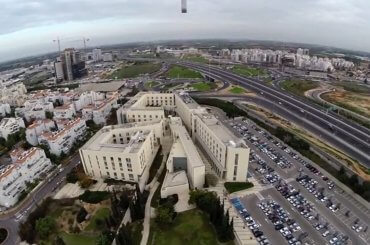
In the early 1950s, a few years after its establishment, Israel began work to divert the course of the Jordan River into its borders occupied in 1948. In 1967, Israel would go on to occupy all of Palestine and the Golan Heights to Jabal al-Sheikh (Mt. Hermon), the main source of the Jordan River. By occupying Jabal al-Sheikh, Israel has the power to block any possible attempts by Arab states to divert some tributaries of the Jordan River and reduce the amount of water that reaches the river in response to the Israeli control over the river.
The Dead Sea has lost about a third of its area in less than a hundred years. The main reason is the decrease of the water flowing from its main feeder, the Jordan River. The amount of water flowing through the Jordan River south of Lake Tiberias decreased from about 1.5 billion cubic meters annually in the first half of the last century to only about 200 million cubic meters. The rate of decrease in the Dead Sea is accelerating at a rate of one to one and a half meters annually, due to climate change, rising temperatures, and consequently an increase in the rate of evaporation. Therefore, scientists and experts agree that the real death of the Dead Sea will be by the year 2050 if the situation remains as it is today.
Apart from the environmental disasters whose negative impacts are hard to predict on the biological and natural diversity of the Jordan River and Dead Sea region, the indifference of the concerned parties – which include Israel, Jordan, the Palestinian Authority, the United Nations, environmental protection organizations, as well as religious institutions – by accepting the fact that the Jordan River and the Dead Sea are drying up will have profound and devastating repercussions on all parties and will affect not only the economic sector, agriculture, tourism and industry but also the basic human existence in this part of the earth as well.
Jordan River
The Jordan River has a significant and unique importance, in addition to the 350 km stretch which transforms the lands surrounding its banks into fertile lands, the foundation of food security. Moreover, the river’s waters have a paramount importance in feeding groundwater basins.
Furthermore, for the 2.5 billion Christians around the world the river and its water are considered sacred. Saving this river would have returns on investments in religious tourism on the Jordan River that outweigh any investments in other natural resources.
Dead Sea
There is no justification for the indifference of the concerned parties towards the fact that the lowest point on earth is drying up, the sea whose water is 8 times saltier than the oceans and other seas. The Dead Sea water, rich in salt and minerals, has curative properties for many diseases in addition to being the area with the most oxygen concentration and the highest air pressure in the world. Also, experts claim that the Dead Sea sun beams are harmless due to the natural filtering of ultraviolet rays thanks to the density of the ozone layer and the thick and heavy fog caused by the evaporation of mineral salts in the sky of the Dead Sea. It is a natural treasure whose disappearance could not be imagined.
What can be done?
Certainly, the concerned parties realize the consequences of the drying up of the Dead Sea and River Jordan, they have tried to come up with solutions such as the “Two Seas Canal” which planned on opening a canal which connects the Red Sea’s water with the Dead Sea. The idea of this project started more than 20 years ago, and after various studies and fundraising, the project is no longer on the table.
I assume that the main reason for the loss of interest is the uncertainty that the project will succeed without violating the environment of the Dead Sea, as experts say, in addition to the high financial cost of the project.
The natural, easiest, and fastest solution for the shortage of water, is for Israel to reverse its destructive tampering with nature and the environment by restoring the waters of the Jordan River to its natural course. The concerned parties, including Israel, must rely on desalinating the waters of the Mediterranean and the Red Sea to meet their water needs. The concerned parties should also agree on how to invest in the Jordan River and the Dead Sea in a fair and environmentally friendly manner.
Undoubtedly, the biggest obstacle to restoring life to the Jordan River and the Dead Sea is Israel. Therefore, an international campaign must be launched that includes Israeli environmental institutions and activists who are aware of the crime of their state and the importance and speed of action to save the Dead Sea. The international campaign should explain and expose Israel, which bears the main responsibility for its tampering with nature, the drying up of the sacred waters of the Jordan River, and the dryness of the Dead Sea, to force Israel to reverse the diversion of the Jordan River and restore life to it and the Dead Sea.
An Arabic version of this article was published in Al Quds newspaper on December 10, 2021. Translated from Arabic by Dana Ammous.


